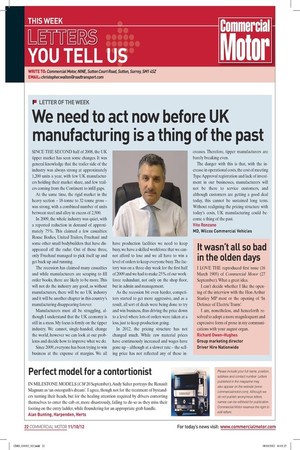We need to act now before UK manufacturing is a thing of the past
Page 18

If you've noticed an error in this article please click here to report it so we can fix it.
SINCE THE SECOND half of 2008, the UK tipper market has seen some changes. It was general knowledge that the trailer side of the industry was always strong at approximately 1,200 units a year, with few UK manufacturers holding their market share, and few trailers coming from the Continent to infill gaps.
At the same time, the rigid market in the heavy section – 18-tonne to 32-tonne gross – was strong, with a combined number of units between steel and alloy in excess of 2,500.
In 2009, the whole industry was quiet, with a reported reduction in demand of approximately 75%. This claimed a few casualties: Rouse Bodies, United Trailers, Fruehauf and some other small bodybuilders that have disappeared off the radar. Out of those three, only Fruehauf managed to pick itself up and get back up and running.
The recession has claimed many casualties and while manufacturers are scraping to fill order books, there are likely to be more. This will not do the industry any good, as without manufacturers, there will be no UK industry and it will be another chapter in this country’s manufacturing disappearing forever.
Manufacturers must all be struggling, although I understand that the UK economy is still in a mess. My focus is firmly on the tipper industry. We cannot, single-handed, change the world, however we can look at our problems and decide how to improve what we do.
Since 2009, everyone has been trying to win business at the expense of margins. We all have production facilities we need to keep busy, we have a skilled workforce that we cannot afford to lose and we all have to win a level of orders to keep everyone busy. The factory was on a three-day week for the first half of 2009 and we had to make 25% of our workforce redundant, not only on the shop floor, but in admin and management.
As the recession bit even harder, competitors started to get more aggressive, and as a result, all sort of deals were being done to try and win business, thus driving the price down to a level where lots of orders were taken at a loss, just to keep production going.
In 2012, the pricing structure has not changed much. While raw material prices have continuously increased and wages have gone up – although at a slower rate – the selling price has not reflected any of these in creases. Therefore, tipper manufacturers are barely breaking even.
The danger with this is that, with the increase in operational costs, the cost of meeting Type Approval registration and lack of investment in our businesses, manufacturers will not be there to service customers, and although customers are getting a good deal today, this cannot be sustained long term. Without realigning the pricing structure with today’s costs, UK manufacturing could become a thing of the past.
Vito Ronzano MD, Wilcox Commercial Vehicles











































